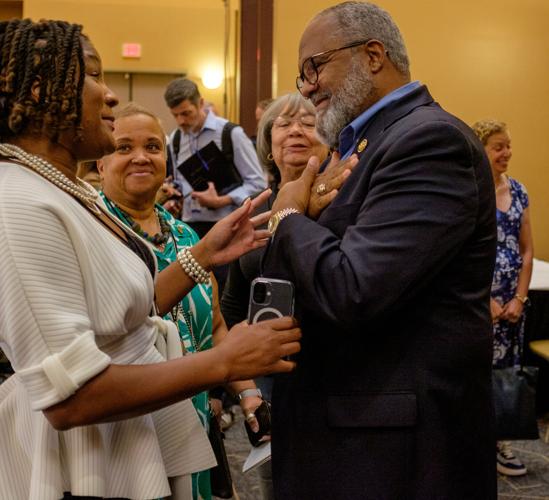WASHINGTON — With B-2s flying overhead during an Independence Day ceremony, President Donald Trump signed the Republicans’ One Big Beautiful Bill Act into law.
With that signature, Trump created one of the main battlefields in the fight to control Congress, where Republicans can afford to lose no more than three seats in the House and four in the Senate.
Looking at a series of polls that indicate the bill’s unpopularity nationwide, Democrats have resolved to make the 2026 midterm elections about cuts to Medicaid.
Even in Louisiana, where Republicans dominate the statewide political scene, both parties are gearing up to argue the merits and faults of the bill that codifies much of Trump’s agenda.
House Speaker Mike Johnson, R-Benton, and other Republicans have been talking up how they believe the legislation’s tax breaks will help working Americans and will energize the U.S. economy.
Democratic officials are counting the number of rural hospitals they say will close and the number of people they say will lose health care to pay for those tax cuts.
On Fox News Sunday, Johnson pooh-poohed Democratic opposition and challenged the minority to “bring it on.”
“Our Republicans are going to be out across the country telling the simple truth, and guess what?,” Johnson said, “Everyone will have more take-home pay. They’ll have more jobs and opportunity. The economy will be doing better. And we will be able to point to that as the obvious result of what we did.”
Party campaign organizations and their supporting issue groups are already rolling out advertising that either blasts or exalts the bill.
The conservative grassroots group Americans For Prosperity, for example, paid for a commercial that called the tax cuts a “historic win." House Democrats launched ads targeting 35 Republicans for backing reductions to Medicaid, according to New Jersey Spotlight News.
“Elections have consequences, and this bill is an example of what Republicans will do with unchecked power,” said Rep. Troy Carter, D-New Orleans. “I’m going to make sure Louisianians know exactly what this bill does, so that they can be informed voters in the 2026 midterms.”
Carter was speaking prior to hosting a Thursday night town hall on the Xavier University campus in New Orleans that featured top Democratic chiefs, including House Minority Leader Hakeem Jeffries. The Brooklyn Democrat made a number of appearances last week, from news shows on MSNBC to “The View,” a daytime talk show.
“We are going to do everything we can, no matter how long it takes, to reverse the damage being done to the American people,” Jeffries said Thursday night.
Democrats will have to contend with the new law’s timing. Most voters will see lower tax bills when they file their federal income tax returns by April 15, 2026. But the restrictions Democrats fear — and some experts predict — will lead eventually to closed rural hospitals and millions losing their health care coverage won’t begin until January 2027 and 2028 in some cases.
Midterms conclude in November 2026.
That’s why Louisiana Democrats are looking for challengers with certain skills in four of the six House districts with Republican incumbents, said Randal Gaines, chair of the state party.
He wants to find seasoned candidates who won’t buckle under the national scrutiny sure to accompany races in a state that is home to the top two GOP House leaders and a member of the powerful House Appropriations Committee.
Gaines wants candidates who have a history of public service and of getting things done. Someone who can articulate in kitchen table terms the coming, but not yet arrived, impact of the new law on Medicaid.
Republican incumbents represent about 848,400 Medicaid constituents who were part of Trump’s 58% to 60% Louisiana wins in three presidential elections.
Louis Reine, whose state AFL-CIO comprises a significant block of Democratic voters, says the midterm elections will increase the conversation in Louisiana but likely won’t change the roster of Republican congresspersons.
“I don’t see it happening in a very, very red state” like Louisiana, where Republicans hold all the statewide posts and the Legislature, Reine said Thursday.
However, in swing districts that could go either way, Democratic pressure on the Trump bill could make a difference, he said. Though Republicans did win and did embarrass Democrats last year, Trump won the election by only 1.5% of the vote nationwide.
“If the Democratic argument resonates in the congressional districts that are not really blue or really red and that swings four or five districts, it could totally change the balance in Congress,” Reine said.





